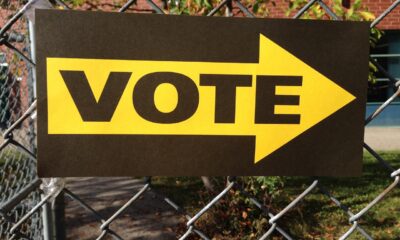Constitution
Thinking Constitutionally About the Electoral College

Maine and Nebraska are not typically considered swing states in presidential elections. But as the only states that divide their electoral votes by congressional district, they may hold the key to victory in the 2024 election, which will likely be won on razor-thin margins.
Electoral College machinations in Nebraska and Maine
Yet back in April, both Nebraska Republicans and Maine Democrats moved to change how they allocate their electoral votes and prevent their states from splitting their votes.
In Nebraska, Republicans – both inside and outside the state – have put considerable pressure on legislators to change Nebraska back to a winner-take-all system.
Democrats in Maine responded by threatening to change to a winner-take-all system if Nebraska reverts back, nullifying any benefits Republicans might have hoped to gain. Yet Maine Democrats went a step further. They became the 17th state to join the National Popular Vote Interstate Compact. Under this compact, a state commits its electoral votes to the winner of the national popular vote, regardless of how the state itself voted. While the compact has not gone into effect, it is a way to circumvent the Electoral College. Notably, all the participating jurisdictions are predominantly Democratic.
Such moves make perfect sense from a partisan perspective, yet they undermine deeper constitutional principles. They demonstrate the need for Americans to think more constitutionally, as well as to recognize the basic purpose of the Electoral College.
A President of majorities of people and States both
In the Constitutional Convention, delegate James Wilson remarked that presidential selection was “the most difficult of all on which we have had to decide.” The Electoral College ultimately emerged as a compromise between supporters of direct popular election and supporters of legislative selection. Importantly, it was initially proposed and supported by proponents of popular election, suggesting that these delegates viewed the Electoral College as a democratic proxy for direct popular election.
Indeed, in nearly every election the Electoral College has served as that proxy, tracking the winner of the popular vote. The four elections where the popular vote loser won the Electoral College – 1876, 1888, 2000, and 2016 – represent a “failure” rate of only 6.78%.
The Electoral College, however, is meant to be more than a simple proxy for the popular vote. Above all, it serves to bring two distinctive majorities together in presidential elections: those of the people and the states. It underscores the fact that the United States is, in the words of James Madison and other Framers, “partly national, partly federal.” Under the Constitution, the states are supposed to have a significant role to play in presidential elections.
By forcing presidential candidates to appeal to these different and overlapping majorities, the Electoral College works to ensure that successful candidates possess independence and legitimacy through being elevated by a broad national constituency. The Founders did not want a presidential candidate to run up the vote in a few states or geographical areas.
The Electoral College forced Biden to campaign in all States, not just the safe ones with all the people
President Biden’s election in 2020 is an excellent example of how the Electoral College accomplishes this. Biden secured Democratic safe states on the West Coast and Northeast. And he won back the Upper Midwest swing states that had gone for Trump in 2016. Biden even won the traditionally Republican states of Arizona and Georgia, thereby moving the Southwest into the Democratic column and reopening the South as a competitive area.
To ignore the Electoral College’s function in seeking to expand and legitimize presidential elections loses sight of its constitutional purpose and diminishes our understanding of our political institutions. The partisan actions of Nebraska Republicans and Maine Democrats are more likely to convince people the institution is no longer useful in modern government.
Why shouldn’t every State allocate electors as Nebraska and Maine do?
Defenders of the Electoral College would find more support by encouraging states to move to resemble Nebraska and Maine, not the other way around.
Having diverse methods of allocating electoral votes will further encourage candidates to appeal to a broader national constituency, helping to give partisan minorities in “safe” states more attention and bring electoral vote margins closer to the popular vote.
For example, had every state used the congressional district method in 2020, Biden would have won 51.6% of the Electoral College, nearly identical to his 51.3% of the popular vote. Such reforms would thereby prevent the disenfranchisement of voters that currently occurs with winner-take-all systems. It would also retain the Electoral College’s basic functions in recognizing the states as important actors under the Constitution and orienting candidates to cultivate broad-based national coalitions.
Conversely, opponents of the Electoral College should consider how alternative plans would fit with the Constitution’s underlying logic. They could reasonably argue that they are simply bringing presidential selection more in line with the original, nationalistic vision of the Framers and presidents who argued for popular election. Similarly, just as the Seventeenth Amendment changed the method by which U.S. senators are selected – moving those elections from state legislatures to the people directly – a shift toward a national popular vote for president could be viewed as a logical next step, completing the democratization of our electoral institutions.
Don’t throw shade on the Constitution
There is nothing in the Constitution that mandates how states allocate their electoral votes. But if we are to improve our electoral system, particularly in electing our nation’s highest office, reforms must be driven by constitutional considerations, not partisanship.
This article was originally published by RealClearPublicAffairs and made available via RealClearWire.
Jordan Cash is an Assistant Professor at James Madison College at Michigan State University and is a fellow with the Jack Miller Center.
-

 Accountability3 days ago
Accountability3 days agoWaste of the Day: Principal Bought Lobster with School Funds
-

 Civilization7 hours ago
Civilization7 hours agoWhy Europe Shouldn’t Be Upset at Trump’s Venezuelan Actions
-

 Executive1 day ago
Executive1 day agoHow Relaxed COVID-Era Rules Fueled Minnesota’s Biggest Scam
-

 Constitution2 days ago
Constitution2 days agoTrump, Canada, and the Constitutional Problem Beneath the Bridge
-

 Civilization1 day ago
Civilization1 day agoThe End of Purple States and Competitive Districts
-

 Christianity Today7 hours ago
Christianity Today7 hours agoSurprising Revival: Gen Z Men & Highly Educated Lead Return to Religion
-

 Civilization5 days ago
Civilization5 days agoThe devil is in the details
-

 Executive20 hours ago
Executive20 hours agoWaste of the Day: Can You Hear Me Now?







